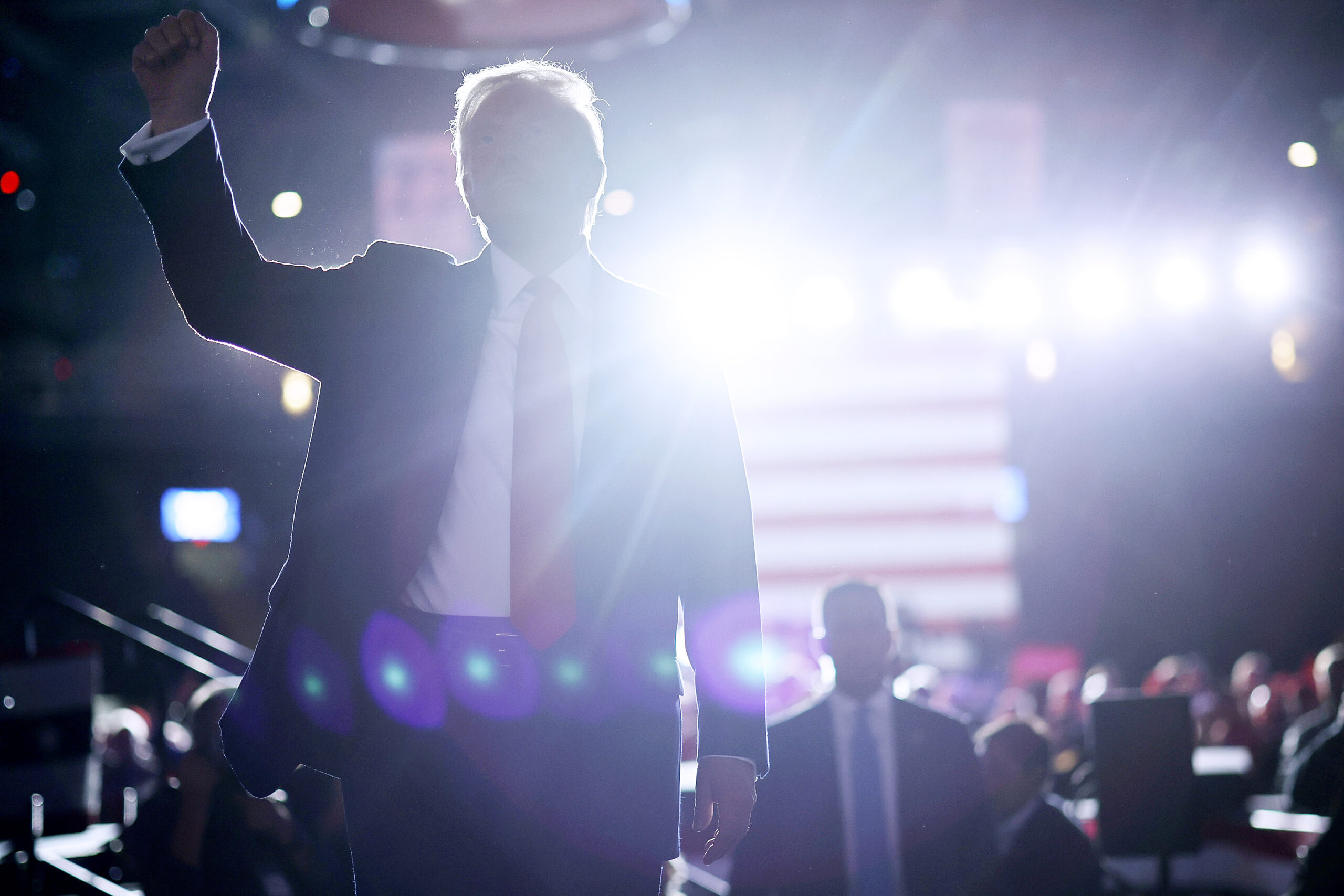
As Donald Trump prepares to take the oath of office on Monday, historian Sean Wilentz offers a sobering assessment of how the incoming administration will wield its authority. The author of The Rise of American Democracy, a pre-Civil War history of the United States, Wilentz warns that Trump aims to reshape federal power in order to amass enormous power for himself. Aided by a reactionary movement now in control of all three branches of government, Trump’s presidency, Wilentz suggests, will fundamentally challenge American democratic traditions.

Wilentz sees troubling historical parallels to what he describes as Trump’s “rolling coup.” He cites the pre-Civil War period, when the country was deeply divided and a reactionary slave-holding elite held sway. He also points to authoritarian and fascist leaders in Europe, who have used democratic institutions to undermine democracy.
Wilentz, professor of American History at Princeton University, spoke to Capital & Main from his office on the Princeton campus.
This interview has been edited for brevity and clarity.
Capital & Main: Trump is being sworn in next week. From an American historian’s point of view, what kind of regime are we facing?
Sean Wilentz: If we are going on the basis of what he has said, Trump’s presidency is going to be a kind of klepto-oligarchy in which a lot of power will be concentrated in the hands of the White House. It will commence with the intention of dramatically overhauling not just the bureaucracy, but the very structure of the Constitution insofar as it applies to executive power.
I worry, for example, about the Fourteenth Amendment, which grants citizenship to people born or naturalized in the United States. The amendment — which also guarantees equal protection under the law and prohibits insurrectionists from holding public office — has clearly already been damaged by court rulings.
In your recent article in Liberty magazine, you describe Trump and his enablers as engaging in a “rolling coup.” But many commentators, even liberal writers, emphasize that he won fair and square this time.
He did win fair and square. But, as I’ve always said, the coup is larger than the election. Those behind the coup would have tried to overthrow the election if he had lost, but he won, allowing the coup to proceed unimpeded. A coup need not be an illegal seizure of power. In modern history, strongmen and dictators have used democratic processes and institutions in order to take over and install an entirely new and undemocratic political order.
Trump and his supporters aim to put religion at the center of American civic and cultural life in a way we’ve never seen in American history. The Christian nationalists want basically to undo the separation of church and state. And this is not just a conspiracy theory. Project 2025 is absolutely a blueprint for what the Trumpists intend to do, and America is going to look very different in four years if they get their way.
“There are elements, shall we say, of the Confederacy at the heart of some of what the Trump movement is about, if not Trump himself.”
You’ve written that Trump wants to be a “duce,” a reference to Mussolini. But you refrain from using the F-word — fascism. Is that because the term has been used so loosely in contemporary discourse?
I could very well have called him fascistic, but the term can be misleading. It confuses more than it illuminates. I try to be exact about these things. The contempt for democracy is perfectly in line with what the fascists in Europe did in the 1920s and 1930s. In the German case, Hitler used democratic institutions to destroy democracy.
The problem is that when you say “fascist,” people think about death camps, so I didn’t want to evoke that. Although there very well may be a kind of concentration camp system in terms of rounding up undocumented immigrants.
History doesn’t repeat itself but occasionally it rhymes. What similarities do you see to earlier periods in our history?
There are elements, shall we say, of the Confederacy at the heart of some of what the Trump movement is about, if not Trump himself. You saw this symbolically on Jan. 6, with people carrying Confederate flags. And there is an idea among some people that the federal government must be basically destroyed and that power should go back to the local elites rather than to the national government. That’s very much in line with what was going on in the 1850s, [prior to the Civil War]. So, there is a continuity.
You’ve written about how abolitionists defied federal law to protect runaway slaves by using the Underground Railroad to move them to safety. Might we see a similar defiance of federal law in response to some of Trump’s initiatives?
One example would be resistance to people being arrested in some parts of the country for administering abortions or receiving them. There already is a resistance to that. That’s not defying the federal government but state governments, though in the future that will depend on whether Congress passes a national anti-abortion act, which the Republicans could try to do.
It’s a different kind of Underground Railroad than in the 1850s. It existed before Roe v. Wade and it exists again now. Women would help other women get to doctors. The same thing with undocumented immigrants. If things get heavy, it’s entirely possible there would be groups of people who try to find ways to protect and harbor them from government authorities.
In your book, The Rise of American Democracy, you outline the emergence, before the Civil War, of “two distinctive democracies,” one Northern and one Southern, based on slavery. Do we have two different democracies now?
I think we probably do. The Confederates were not exactly champions of American democracy. They wanted to separate and form their own republic and had a master race idea of democracy based on the idea that whites were superior to Blacks. But today a highly reactionary populist force has now taken power in the United States, controlling all three branches of the federal government. We’ve never seen that in American history before, and that’s what makes it unlike what happened in the 1850s and 1860s.
What we have now is a situation where you have a demagogue who has nothing but contempt for democratic institutions unless they serve his interest. It’s a kind of faux democracy which is, in fact, anti-democratic.
“The idea of Elon Musk adapting to this regime doesn’t surprise me at all as I don’t think he has much of a stake in American democracy.”
What do you make of the tech and other corporate leaders ingratiating themselves with Trump? For example, the Washington Post and the L.A. Times pulled endorsements of Vice President Kamala Harris. Many say Facebook’s elimination of its fact checking department was part of that trend.
It’s completely predictable. Conservatives have traditionally thought that they could get advantage from these populist demagogues. That was certainly the case in Germany in the ’30s. It was true to a certain extent with Italy as well. Conservatives are the ones who paved the way for these regimes to take over. That’s what’s been going on for a long time inside the Republican Party. They don’t have fixed political principles; they have desires for economic and political power.
The idea of Elon Musk adapting to this regime doesn’t surprise me at all as I don’t think he has much of a stake in American democracy. Media outlets are also going to be put under a great deal of pressure, and many will buckle under.
What do the Democrats need to do to win over voters who drifted toward Trump or who decided to stay home?
It’s not simply a matter of finding a politician as skilled as Abraham Lincoln or Franklin D. Roosevelt. First, we have to have major political reorientation inside the Democratic Party. The Democrats have suffered from their party’s more purist elements that, even though a minority, appear to dominate. As a result, Democrats get blamed for a lot of the excesses coming out of the academy and the foundations, excesses that the radical right has exploited.
All regimes become exhausted and play themselves out. What’s your sense of the contradictions and weaknesses of Trumpism that his opponents can push against?
This is a plutocracy, and it’s not serving the interests of average working people. Trump feeds their sense of social resentment and, to that extent, [his appeal is] working. The fact is he’s screwing these people over for the sake of a very small percentage of the American population. That’s the primary contradiction. It goes back to Reagan. To undo the New Deal is not in the interests of the working class, white, Black, Hispanic, purple or green. I think that’s going to be the contradiction that eventually undoes him.
How might future scholars interpret this period given that for many people today it is difficult to comprehend how we arrived here?
What has driven the politics of the last 50 years has been a highly mobilized and well-funded, conservative movement which is not conservative but radical. What historians are going to be looking at is the rise of the reactionary, anti-New Deal and Christian nationalist right wing. It radicalized over the course of the 1990s into the 21st century leading to Trump. It’s a complicated story that would require psychology and sociology to understand, but it’s essentially a political movement. Unless the politics are the center of it, you’re not getting the story.

.png?w=600)





